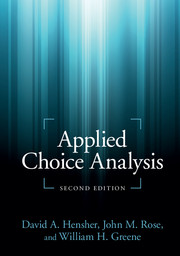Book contents
- Frontmatter
- Contents
- List of Figures
- List of Tables
- Preface
- Part I Getting started
- Part II Software and data
- Part III The suite of choice models
- Part IV Advanced topics
- 20 Frontiers of choice analysis
- 21 Attribute processing, heuristics, and preference construction
- 22 Group decision making
- Select glossary
- References
- Index
21 - Attribute processing, heuristics, and preference construction
from Part IV - Advanced topics
Published online by Cambridge University Press: 05 June 2015
- Frontmatter
- Contents
- List of Figures
- List of Tables
- Preface
- Part I Getting started
- Part II Software and data
- Part III The suite of choice models
- Part IV Advanced topics
- 20 Frontiers of choice analysis
- 21 Attribute processing, heuristics, and preference construction
- 22 Group decision making
- Select glossary
- References
- Index
Summary
This chapter was co-authored with Waiyan Leong and Andrew Collins.
Introduction
Any economic decision or judgment has an associated, often subconscious, psychological process prodding it along, in ways that makes the “neoclassical ambition of avoiding [this] necessity ….unrealizable” (Simon 1978, 507). The translation of this fundamental statement on human behavior has become associated with the identification of the heuristics that individuals use to simplify preference construction and hence make choices, or to make the representation of what matters relevant, regardless of the degree of complexity as perceived by the decision maker and/or the analyst. Despite this recognition in behavioral research as long ago as the 1950s (see Svenson 1998), that cognitive processes have a key role in preference revelation, and the reminders throughout the literature (see McFadden 2001b; Yoon and Simonson 2008) about rule-driven behavior, we still see relatively little of the decision processing literature incorporated into discrete choice modeling which is, increasingly, becoming the mainstream empirical context for preference measurement and willingness to pay (WTP) derivatives.
There is an extensive literature focussing on these matters that might broadly be described as heuristics and biases, and which is crystallized in the notion of process, in contrast to outcome.
- Type
- Chapter
- Information
- Applied Choice Analysis , pp. 937 - 1071Publisher: Cambridge University PressPrint publication year: 2015
- 2
- Cited by



